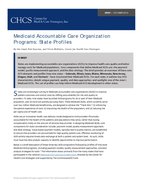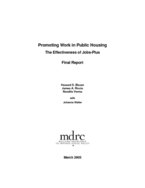Found 14 resources.
0
0
0
A robust research base indicates the importance of high quality early care and education in relation to a host of long term health, education, and employment outcomes. The concept of “quality” in these programs has been the focus of much attention and resources, particularly over the last decade. Most states have established definitions of quality through quality rating and improvement systems (QRIS) and allocated accompanying resources to support early care and education providers to progress toward higher levels of quality. Unfortunately, with few exceptions, definitions of “quality” have...
Topics: Advocacy, CLPHA, Communications, Homelessness, Housing, Legislation & Policy, Metrics, Racial inequalities, Research, Supportive housing, Sustainability
 Shared by Karina George
on Jun 27, 2022
Shared by Karina George
on Jun 27, 2022 0
0
0
The Housing Is team will be joined by staff from the Department of Education and Department of Housing and Urban Development to discuss evaluation considerations and best practices when evaluating multi-sector, community-based interventions such as the Promise and Choice Neighborhoods Initiatives. They will examine how they chose outcomes to track and how they set goals for the Promise and Choice Neighborhood Initiatives. They will also reflect on evaluation design considerations for these multifaceted programs.
Topics: Data sharing, Education, Metrics
 Shared by Stephanie Gray
on Apr 18, 2022
Shared by Stephanie Gray
on Apr 18, 2022 0
0
0
The EMPOWERED study, conducted on behalf of the Assistant Secretary for Planning and Evaluation (ASPE) at the U.S. Department of Health and Human Services, examines the use of performance measures, work requirements and child support cooperation requirements across human services programs. This issue brief is based on three case studies and provides local perspectives on the challenges and opportunities for aligning performance indicators across a variety of federal programs promoting self-sufficiency.
Topics: Legislation & Policy, Metrics, Research
 Shared by Housing Is
on Apr 15, 2019
Shared by Housing Is
on Apr 15, 2019 0
0
0
This annual report analyzes participation in the School Breakfast Program among low-income children nationally and in each state and the District of Columbia for the 2017–2018 school year. The report features best practices for increasing participation in the program, including breakfast after the bell models and community eligibility.
Topics: Child welfare, Education, Food insecurity, Metrics, Nutrition, Research
 Shared by Housing Is
on Mar 1, 2019
Shared by Housing Is
on Mar 1, 2019 0
0
0
During CLPHA’s Education Working Group Webinar on addressing school attendance at PHAs, representatives from the King County Housing Authority and the national nonprofit Attendance Works presented on tools for addressing chronic absenteeism, as well as strategies for fostering a culture of attendance among residents.
Topics: Attendance, CLPHA, Dual-generation, Education, Housing, Housing Is Working Group, Low-income, Metrics, Partnerships, Place-based
 Shared by Housing Is
on Feb 12, 2019
Shared by Housing Is
on Feb 12, 2019 0
0
0
CLPHA’s Education Working Group hosts a webinar including presentations on efforts from the Chicago Housing Authority to work with residents on pursuing postsecondary opportunities, as well as an update from HUD’s Office of Policy Development & Research on data collection around tracking and increasing FAFSA utilization.
Topics: CLPHA, Cost effectiveness, Data sharing, Education, Funding, Housing, Housing Is Working Group, Low-income, Metrics, Midwest, Post-secondary, Research, Stability, Youth
0
0
0
During this All In webinar, Caroline Fichtenberg of SIREN reviewed the current landscape of assessment tools and outcomes measures for social needs. Karis Grounds of 2-1-1 San Diego explained how they incorporated social needs assessment into their Risk Rating Scale, which helps them better serve clients while showing the impact of their services.
Topics: Data sharing, Health, Low-income, Metrics, Partnerships, West Coast
0
0
0

A growing recognition of the importance of social determinants of health (SDOH) has led to a proliferation of screening and assessment tools, but there are currently no national standards for how to systematically capture and address the non-health needs of patients. To provide some guidance for communities just starting out on this path, All In: Data for Community Health hosted a webinar featuring two subject matter experts.
Topics: Data sharing, Health, Metrics, Partnerships
0
0
0
This report aims to provide the Robert Wood Johnson Foundation (RWJF) and other health foundations with a perspective on the emerging intersection of social determinants of health (SDOH), health care systems, and social and other services. These fields intersect in how and what data are collected, and in ways the data are used to improve health and well-being and promote a Culture of Health.
Topics: Data sharing, Funding, Health, Medicaid / Medicare, Metrics, Nutrition, Partnerships, Place-based, Research
 Shared by Housing Is
on Jul 27, 2018
Shared by Housing Is
on Jul 27, 2018 0
0
0
States are implementing accountable care organizations (ACOs) to
improve health care quality and better manage costs for Medicaid populations. Core components that define Medicaid ACOs are: the payment model; quality measurement approach; and the data
strategy. This brief provides an overview of these core ACO elements and profiles how nine states -Colorado, Illinois, Iowa, Maine, Minnesota, New Jersey, Oregon, Utah, and Vermont -have structured their Medicaid ACOs. For each state, it outlines key ACO characteristics; details unique payment, quality, and data approaches; and spotlights ...
Topics: Cost effectiveness, Data sharing, Health, Low-income, Medicaid / Medicare, Metrics
 Shared by Housing Is
on Jul 23, 2018
Shared by Housing Is
on Jul 23, 2018 0
0
0
This final report on MDRC’s evaluation of Jobs-Plus describes the program’s impacts, that is, the difference it made for residents in Jobs-Plus developments in comparison with residents living in similar developments who did not receive the program. These findings offer important lessons to policymakers and program administrators about how to increase the economic self-sufficiency of public housing residents.
Topics: Asset building, Community development, Cost effectiveness, Legislation & Policy, Metrics, Research, Workforce development
 Shared by Housing Is
on Jul 17, 2018
Shared by Housing Is
on Jul 17, 2018 0
0
0
HUD Administrative Data Linked with the National Health Interview Survey
Topics: Attendance, Child welfare, Data sharing, Dental, Health, Housing, Low-income, Medicaid / Medicare, Mental health, Metrics, Racial inequalities, Vision
 Shared by Housing Is
on Jul 10, 2018
Shared by Housing Is
on Jul 10, 2018 0
0
0
MDRC, a nonprofit, nonpartisan education and social policy research firm, released encouraging results from a demonstration, funded by Robin Hood, of two aligned interventions in New York City.
Topics: Early childhood, Education, Grade-level proficiency, Low-income, Metrics, Racial inequalities, Research, Youth
 Shared by Housing Is
on Jul 5, 2018
Shared by Housing Is
on Jul 5, 2018 0
0
0

Why do some neighborhoods appear able to launch effective local improvement initiatives, while others are more hampered by fragmentation and mistrust? Why can some communities mobilize diverse constituencies to influence public policy, while others cannot? Answers to these questions may be found in the specific patterns of collaboration that form among community organizations, and between these groups, schools, public agencies, and elected officials, according to MDRC, a preeminent social-policy research organization.
Topics: Asset building, Child welfare, Community development, Data sharing, Dual-generation, Education, Family engagement, Funding, Health, Housing, Legislation & Policy, Low-income, Metrics, Midwest, Mobility, Out-of-school time, Partnerships, Place-based, Preventative care, Research, Safety, Stability, Workforce development, Youth




